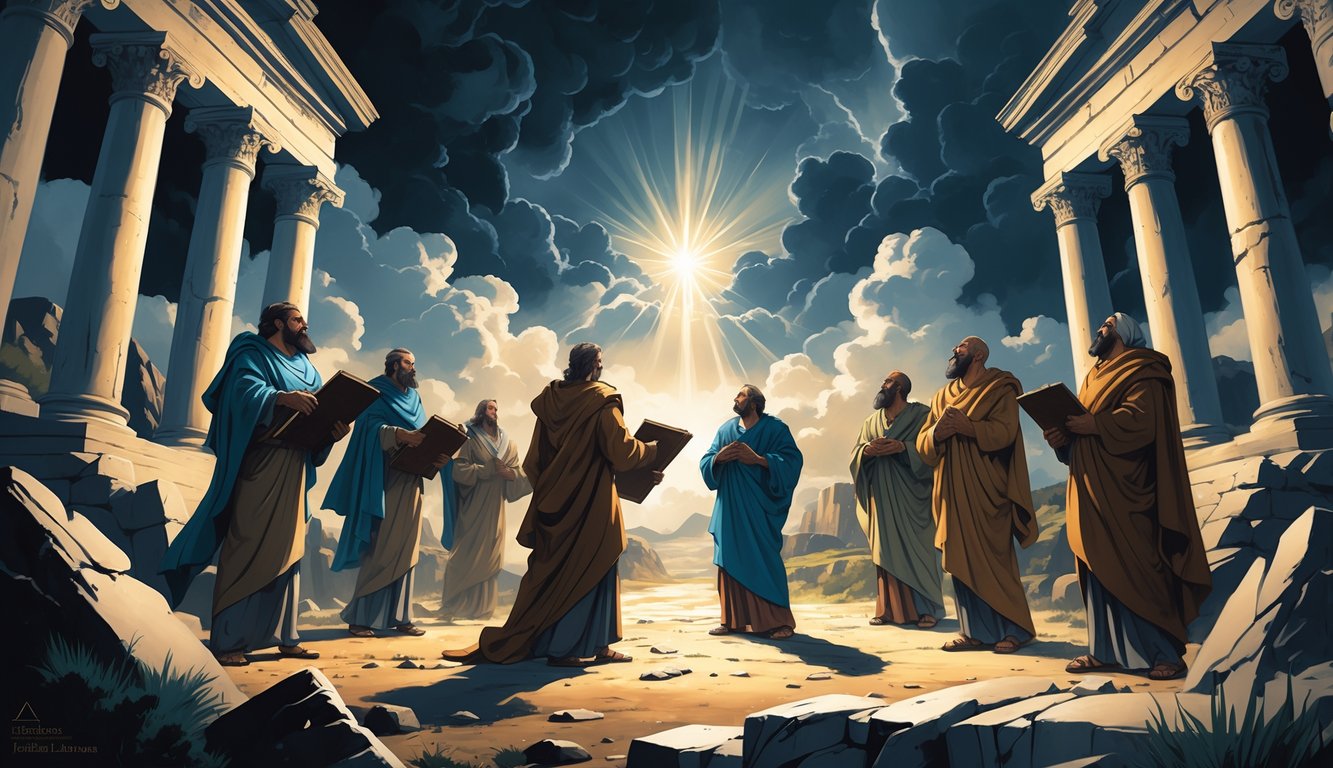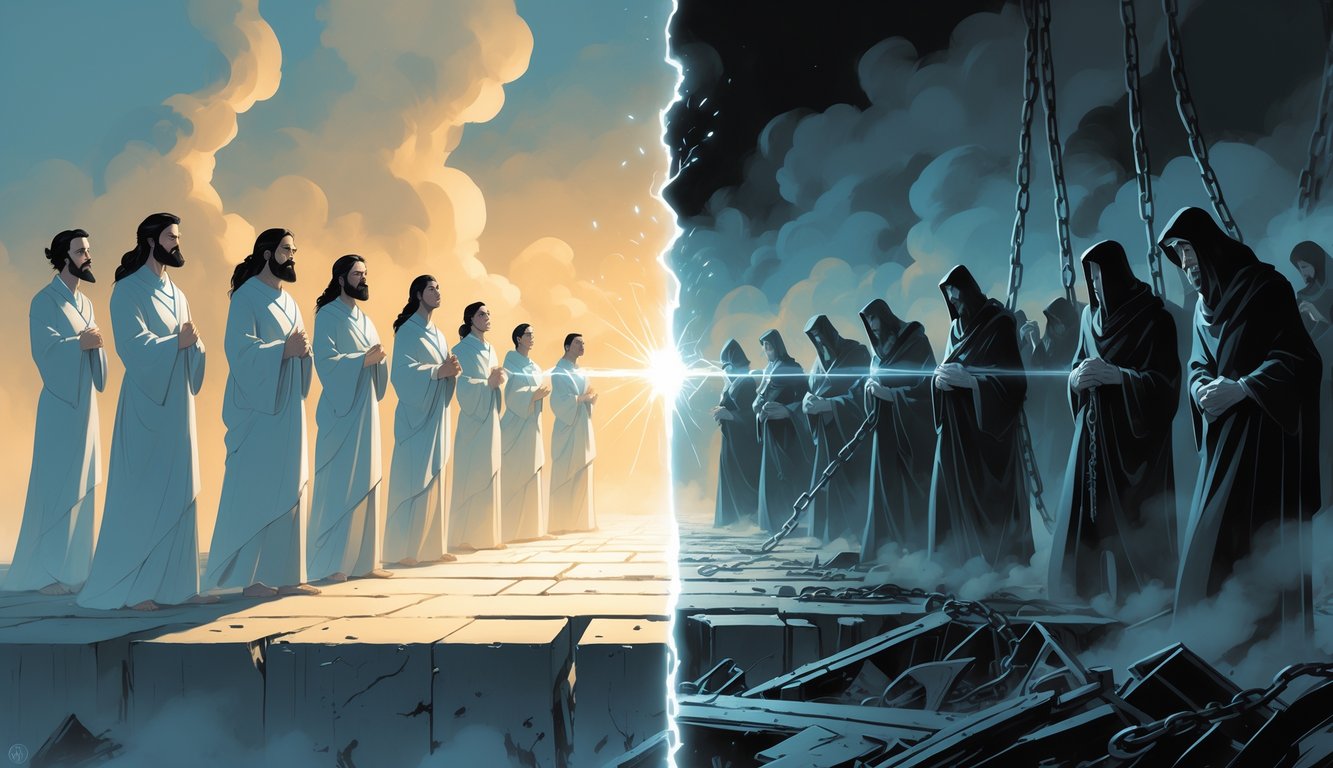False teaching is not a new problem. The Bible warns that just as false prophets misled people in the past, false teachers will appear within the church today.
2 Peter 2 gives clear signs to watch for and explains how to stay grounded in the truth. These warnings are direct and practical. They protect those who follow Christ.


In this chapter, Peter exposes how these teachers work in secret and twist the truth. They use others for personal gain.

Their influence can spread quickly. Many people end up turning away from God’s ways.
Learning to recognize these traits is the first step in avoiding their trap.
By exploring the urgent message of 2 Peter 2, anyone can see how God has dealt with corruption in the past. He also preserves those who remain faithful.
Overview of 2 Peter 2 and Its Urgent Warnings
2 Peter 2 gives a direct warning about the danger of false teachers within the Christian community. It uses real historical examples to show how God deals with those who mislead others and reject the truth.
Purpose and Context of the Epistle
The letter of 2 Peter was likely written near the end of the Apostle Peter’s life, around the mid-60s AD. He addressed believers who faced pressure from both outside persecution and internal deception.
Peter wanted to prepare them for the reality that false teachers would arise, just as false prophets had appeared in Israel’s history. These teachers would present distorted versions of the faith, often for personal gain.
The warning in 2 Peter 2 is not abstract. It names the problem—destructive heresies—and points to the danger of denying Jesus.
Peter’s tone is urgent because these teachings could lead people away from salvation. By grounding his warning in past events, such as the judgment of fallen angels and the flood in Noah’s time, Peter reminded believers that God’s justice is certain.
The same God who judged in the past will also act in the present.
Central Themes of the Chapter

The chapter focuses on three main dangers:
- Deceptive teaching – False teachers secretly introduce ideas that contradict the gospel.
- Immoral living – Many of them follow greed, lust, and exploitation.
- Certain judgment – God will bring justice, as shown through past examples like Sodom and Gomorrah.
Peter describes these teachers as bold and arrogant. They exploit others with fabricated stories, as seen in BibleHub’s study notes.
The chapter also warns that many will follow these teachers. This makes discernment essential.
This is not just a leadership issue. It affects the whole church.
The Role of Scripture in Discernment
Scripture is the believer’s main defense against deception. Peter had just affirmed in chapter 1 that prophecy came from God, not human will.
This makes the Bible a reliable guide. When Christians know the truth, they can recognize lies.
Comparing any teaching with the clear message of Scripture helps expose false ideas. Regular study, prayer, and teaching from trustworthy leaders strengthen this discernment.
As Learn Bible Daily notes, faith and moral integrity grow when believers stay rooted in God’s Word. Without Scripture as the standard, opinions and feelings can replace truth.
Peter’s warning shows that knowing the Bible is not optional. It is essential for spiritual safety.
Identifying False Teachers: Traits and Tactics

False teachers often present themselves as trustworthy. Their actions and teachings reveal the truth.
They use subtle methods to spread error and distort doctrine. They take advantage of others for personal gain.
Recognizing these patterns helps protect individuals and communities from spiritual harm.
Characteristics of False Teachers
According to 2 Peter 2:1-3, false teachers work in secret to introduce beliefs that oppose God’s truth. They may appear sincere but hide motives that are self-serving.
They often deny core truths about Jesus, including His authority and role as Savior. This rejection can be direct or hidden in misleading interpretations of Scripture.

Their influence targets those who are unstable in faith or lack strong biblical understanding. This makes people more likely to accept teaching that feels appealing but is spiritually harmful.
Common traits include:
- Twisting Scripture to fit personal agendas
- Rejecting correction or accountability
- Seeking followers for personal recognition
Destructive Heresies and Doctrinal Corruption
False teachers introduce destructive heresies—teachings that damage faith and lead people away from God. These ideas often mix truth with error, making them harder to detect.
They may question or redefine key doctrines, such as the nature of Christ, salvation, or the authority of the Bible. This slow erosion of truth can corrupt a church’s teaching over time.
2 Peter 2:1 warns that such heresies bring spiritual ruin. The danger lies not only in wrong ideas but in the way they replace God’s truth with human opinion or selfish ambition.

Teachers who spread these ideas often present them as “new insights” or “deeper truths.” They sound appealing to those seeking something fresh or different.
Exploitation and Deceptive Practices
Many false teachers are motivated by greed. They exploit others through fabricated stories or emotional appeals designed to gain money, loyalty, or influence.
They may use persuasive speech, false promises, or exaggerated testimonies to gain trust. Once trust is established, they manipulate followers for personal benefit.
2 Peter 2:3 notes that such teachers use deception to make a profit. This can include selling false hope or promoting unbiblical “guarantees” of blessing.
Their tactics often blend religious language with self-promotion. This makes it difficult for some to see the underlying corruption.
Historical Examples of Judgment and Deliverance


God’s past actions show that He both punishes wrongdoing and protects those who remain faithful. These events serve as reminders that His justice is consistent and that His care for the righteous is certain.
Judgment of Fallen Angels
According to 2 Peter 2:4, God did not spare the fallen angels when they sinned. He cast them into gloomy dungeons, holding them for the final judgment.
These angels abandoned their proper position and rebelled against God’s authority. Their punishment was immediate and severe.
The text parallels accounts in Jude 6, where the angels are “kept in eternal chains.” This example warns that spiritual rebellion leads to certain judgment, regardless of status or power.
The Days of Noah

In the time of Noah, human wickedness had spread across the earth. Violence, corruption, and moral decay filled society.
God decided to bring a global flood as judgment. Yet, He preserved Noah, a preacher of righteousness, along with his family.
They were saved in the ark while the rest of the world perished. This account shows both God’s readiness to judge widespread sin and His ability to deliver those who remain faithful.
The story also reflects the warning found in 2 Peter 2 that the righteous will not be forgotten, even in times of great destruction.
Sodom and Gomorrah’s Destruction
Sodom and Gomorrah became known for extreme wickedness, including injustice and immoral behavior. God sent angels to warn Lot and his family to leave before destruction came.

Fire and sulfur rained down, wiping out the cities completely. Lot and his daughters escaped, but his wife looked back and became a pillar of salt.
This event demonstrates that God will act against persistent sin. He also rescues those who trust Him.
The example of Sodom and Gomorrah reinforces Peter’s message that judgment is certain for the ungodly, yet deliverance is real for the righteous.
The Righteous Amid Corruption: Encouragement for Believers

God does not ignore the faithful when evil surrounds them. He knows how to preserve those who live by righteousness while bringing justice to the corrupt.

His past actions show that His care for the upright is steady and sure.
The Example of Righteous Lot
The story of righteous Lot in Genesis 19 offers a clear picture of God’s concern for the faithful. Lot lived in Sodom, a city filled with moral corruption and violence.
Even though he was surrounded by wickedness, he kept a different standard of living. Lot’s distress over the city’s sin showed his desire for righteousness.
He did not join in the evil practices around him. Instead, he tried to protect strangers and act with fairness.
When judgment came, God sent angels to lead Lot and his family out before destruction fell. This act proved that God can rescue His people even in the middle of chaos.

As 2 Peter 2:7-8 notes, Lot’s example reminds believers that God sees their struggles and will not forget their faithfulness.
God’s Protection of the Faithful
The account of Lot is not just history—it is a pattern. Scripture teaches that God “knows how to rescue the godly from trials” (2 Peter 2:9).
This means His protection is both intentional and personal. God’s care is not limited to removing danger.
Sometimes He strengthens His people to endure it. In both cases, the faithful are never abandoned.
Believers can take comfort in knowing that His justice works in two ways:
- Deliverance for the righteous.
- Judgment for the wicked.
This dual action shows that God’s timing is deliberate. Even when corruption seems to dominate, His plan for the faithful remains secure.
Preserving Righteousness in a Corrupt World
Living in a morally broken culture can test anyone’s faith. Yet, like Lot, believers can hold to righteousness by making daily choices that reflect God’s standards.
Practical steps include:
- Guarding the mind through truth-filled teaching.
- Avoiding compromise in speech and actions.
- Seeking fellowship with others who value righteousness.
The pull of corruption can be strong. Consistent, small acts of obedience help keep faith steady.
As 2 Peter 2 warns, false teachers and immoral influences will try to lead people astray. Staying alert and committed to God’s ways protects the heart from drifting.
Consequences of Following False Teachers

False teachers lead people into harmful beliefs and actions that damage both their faith and daily life. Their influence often causes moral compromise and spiritual confusion.
This influence can separate people from the truth.
Spiritual and Moral Decay
When people accept the guidance of false teachers, they often begin to justify corrupt behavior. These teachers may promote ideas that excuse greed, sexual immorality, or dishonesty.
Over time, people lose their sense of right and wrong. What once seemed clearly sinful may start to feel acceptable.
This slow change weakens moral integrity. It damages relationships.
According to 2 Peter 2, many followers adopt the same immoral ways as their leaders. This harms them personally and causes others to reject the way of righteousness.
Accountability and Final Judgment
False teachers and their followers remain responsible for their choices. Scripture shows that God holds them accountable for spreading lies and leading others astray.
In 2 Peter 2:1-3, Peter warns that their actions bring “swift destruction” on themselves. This judgment will come, even if it does not happen right away.
God judged fallen angels, sent the flood in Noah’s time, and destroyed Sodom. These events show that God does not ignore corruption.
For those who follow false teachers, turning from righteousness to embrace deception leads to justice.
The Tragic State of Apostasy
Apostasy means abandoning the truth after once knowing it. This is a serious consequence of following false teachers.
In 2 Peter 2:20-22, Peter describes people who escape the corruption of the world through Christ but later return to it. He says their final state is worse than before they believed.
Rejecting the truth after knowing it hardens the heart. It makes repentance less likely and deepens spiritual blindness.
Such a fall often leaves people trapped in destructive habits. They become cut off from the life of righteousness they once wanted.
Safeguarding Against Deception: Practical Guidance

Believers can protect themselves from false teachers by keeping their faith rooted in Jesus Christ. Learning what Scripture teaches and putting those truths into practice daily helps them stay safe.
This requires personal commitment and consistent action.
Staying Grounded in Jesus Christ
A strong relationship with Jesus Christ helps people resist deception. When someone knows His teachings well, they can recognize ideas that do not match His words.
They should spend time in prayer and ask for wisdom and discernment. Trust grows as they remember what Christ has done and rely on His promises.
Reading the Gospels regularly helps them see His character and priorities. This makes it easier to spot teachings that distort His message.
Key habits include:
- Daily prayer focused on knowing Christ
- Reading passages that show His life and commands
- Obeying His instructions even when it is difficult
Growing in Knowledge and Faith
False teachers often twist Scripture to fit their own ideas. A believer who studies the Bible carefully can test those claims.
They can use reliable study tools, such as a trustworthy commentary or a Bible study on 2 Peter 2, to understand the context and meaning of passages.
Faith also grows through fellowship with other believers. Group study and discussion allow them to compare interpretations and hold each other accountable.
Practical steps:
- Read Scripture daily, not just favorite verses
- Learn the historical and cultural background of passages
- Discuss difficult topics with mature Christians
Applying Biblical Truths in Daily Life
Knowledge without action leaves a person vulnerable. Living out what Scripture teaches strengthens faith.
Practicing honesty, kindness, and humility in daily situations helps people grow. Following biblical principles at work, in family, and in the community builds habits that align with God’s will.
If a teaching encourages selfishness, greed, or moral compromise, compare it with clear biblical commands. Reject it immediately if it conflicts.
Daily application checklist:
- Match actions with biblical values
- Reject teachings that excuse sin
- Seek counsel from trusted believers before making major decisions












